Analysis of AI's Impact on Human Capital in Malaysian Businesses
VerifiedAdded on 2022/11/28
|35
|10739
|88
Report
AI Summary
This research report investigates the impact of Artificial Intelligence (AI) on human capital management, specifically within the context of Malaysia. The study explores the conceptual understanding of AI and human capital, analyzes AI's effect on human capital, and recommends AI strategies to improve human capital. The report examines the role of AI in automating HR tasks, improving decision-making, and gaining a competitive advantage. The research includes a literature review that discusses AI's application in business marketing, human resource management, finance, and talent acquisition. The research aims to address the gap in the existing literature by measuring the actual impact of AI on human capital management and recommending strategies to improve the human capital management processes with the help of AI. The study is structured into five chapters, covering the introduction, literature review, methodology, data analysis, and conclusion, offering a comprehensive analysis of the topic. The research is significant for business organizations in designing effective business management strategies and increasing business efficiency.
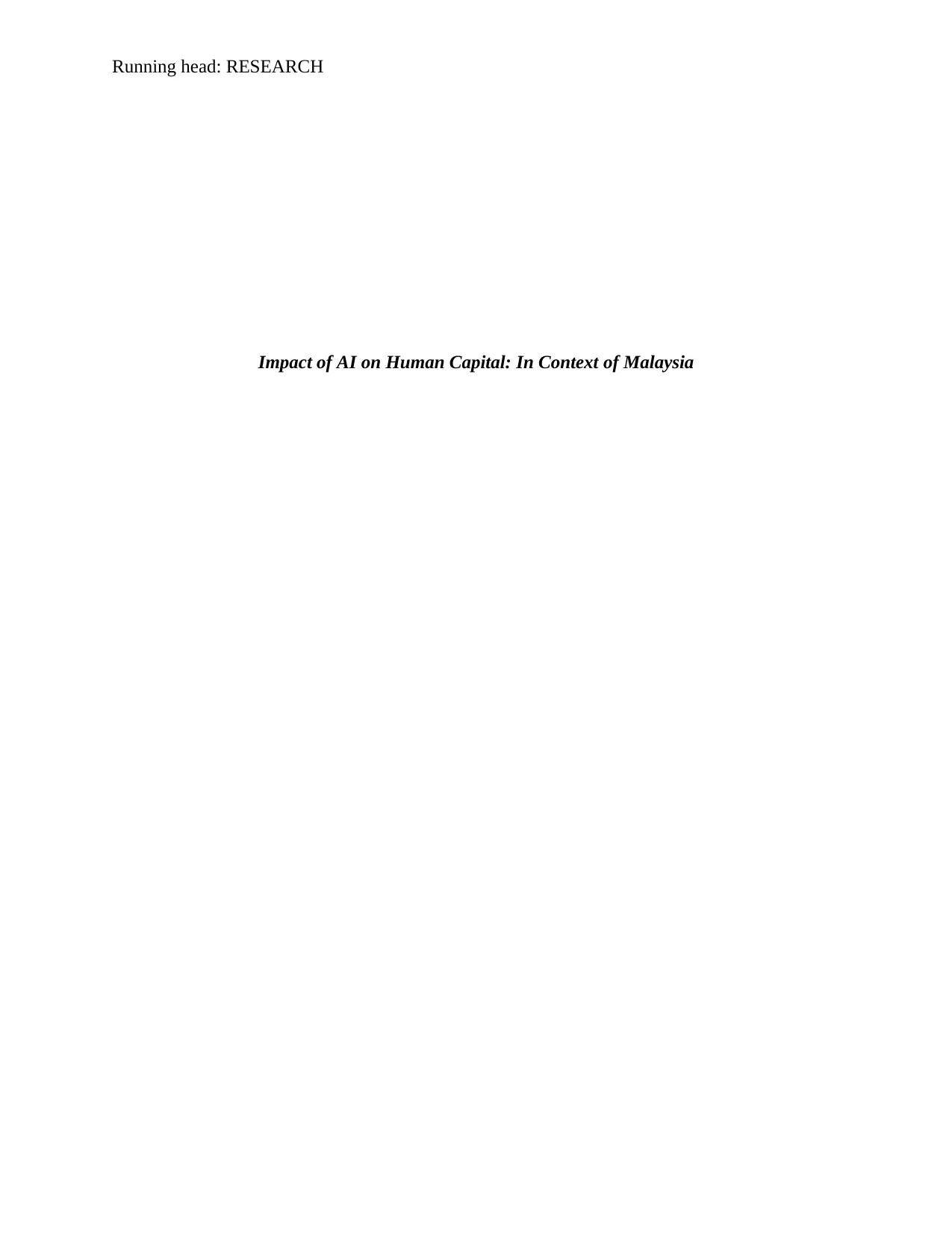
Running head: RESEARCH
Impact of AI on Human Capital: In Context of Malaysia
Impact of AI on Human Capital: In Context of Malaysia
Paraphrase This Document
Need a fresh take? Get an instant paraphrase of this document with our AI Paraphraser

RESEARCH
Acknowledgement
Abstract
TOC
1
Acknowledgement
Abstract
TOC
1
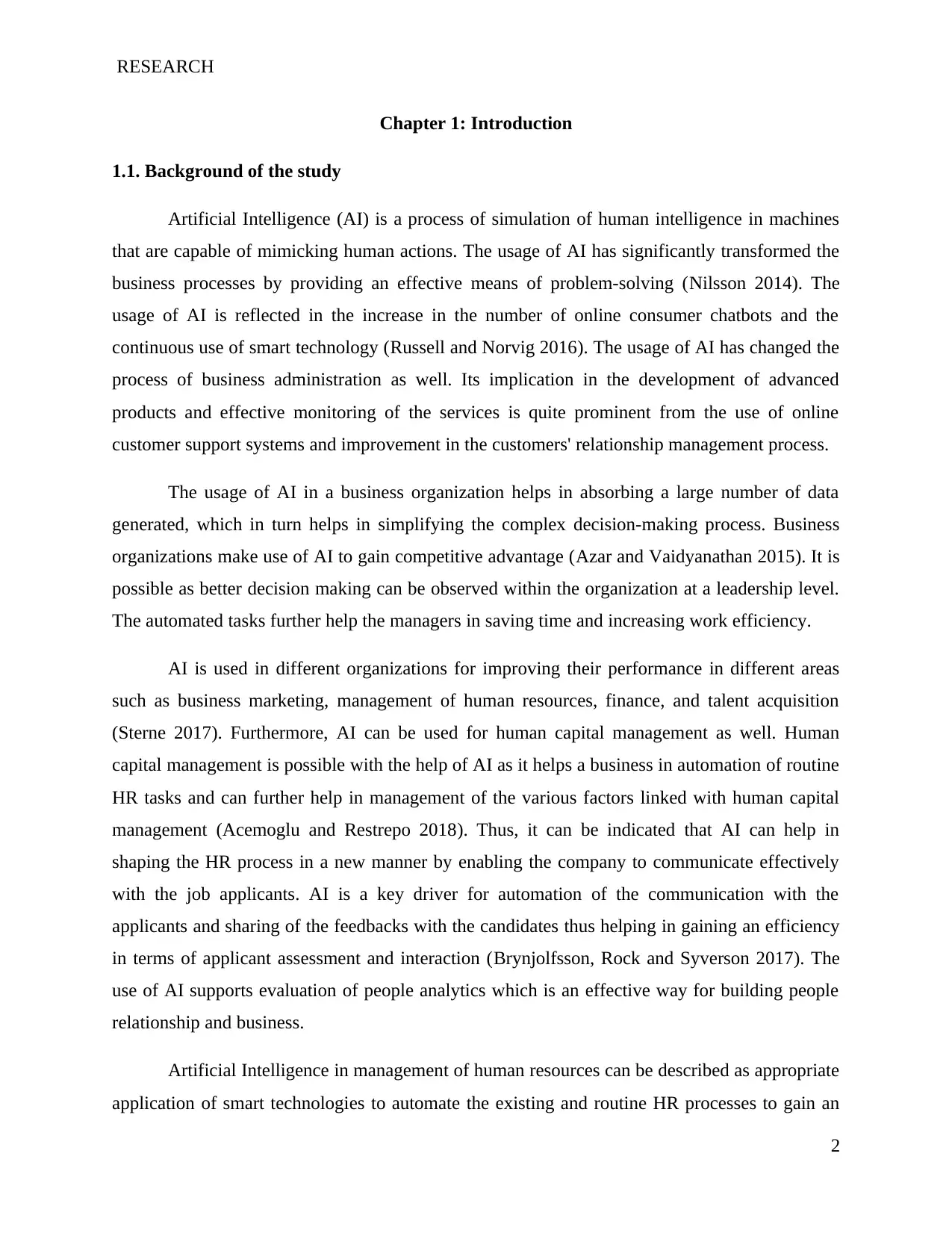
RESEARCH
Chapter 1: Introduction
1.1. Background of the study
Artificial Intelligence (AI) is a process of simulation of human intelligence in machines
that are capable of mimicking human actions. The usage of AI has significantly transformed the
business processes by providing an effective means of problem-solving (Nilsson 2014). The
usage of AI is reflected in the increase in the number of online consumer chatbots and the
continuous use of smart technology (Russell and Norvig 2016). The usage of AI has changed the
process of business administration as well. Its implication in the development of advanced
products and effective monitoring of the services is quite prominent from the use of online
customer support systems and improvement in the customers' relationship management process.
The usage of AI in a business organization helps in absorbing a large number of data
generated, which in turn helps in simplifying the complex decision-making process. Business
organizations make use of AI to gain competitive advantage (Azar and Vaidyanathan 2015). It is
possible as better decision making can be observed within the organization at a leadership level.
The automated tasks further help the managers in saving time and increasing work efficiency.
AI is used in different organizations for improving their performance in different areas
such as business marketing, management of human resources, finance, and talent acquisition
(Sterne 2017). Furthermore, AI can be used for human capital management as well. Human
capital management is possible with the help of AI as it helps a business in automation of routine
HR tasks and can further help in management of the various factors linked with human capital
management (Acemoglu and Restrepo 2018). Thus, it can be indicated that AI can help in
shaping the HR process in a new manner by enabling the company to communicate effectively
with the job applicants. AI is a key driver for automation of the communication with the
applicants and sharing of the feedbacks with the candidates thus helping in gaining an efficiency
in terms of applicant assessment and interaction (Brynjolfsson, Rock and Syverson 2017). The
use of AI supports evaluation of people analytics which is an effective way for building people
relationship and business.
Artificial Intelligence in management of human resources can be described as appropriate
application of smart technologies to automate the existing and routine HR processes to gain an
2
Chapter 1: Introduction
1.1. Background of the study
Artificial Intelligence (AI) is a process of simulation of human intelligence in machines
that are capable of mimicking human actions. The usage of AI has significantly transformed the
business processes by providing an effective means of problem-solving (Nilsson 2014). The
usage of AI is reflected in the increase in the number of online consumer chatbots and the
continuous use of smart technology (Russell and Norvig 2016). The usage of AI has changed the
process of business administration as well. Its implication in the development of advanced
products and effective monitoring of the services is quite prominent from the use of online
customer support systems and improvement in the customers' relationship management process.
The usage of AI in a business organization helps in absorbing a large number of data
generated, which in turn helps in simplifying the complex decision-making process. Business
organizations make use of AI to gain competitive advantage (Azar and Vaidyanathan 2015). It is
possible as better decision making can be observed within the organization at a leadership level.
The automated tasks further help the managers in saving time and increasing work efficiency.
AI is used in different organizations for improving their performance in different areas
such as business marketing, management of human resources, finance, and talent acquisition
(Sterne 2017). Furthermore, AI can be used for human capital management as well. Human
capital management is possible with the help of AI as it helps a business in automation of routine
HR tasks and can further help in management of the various factors linked with human capital
management (Acemoglu and Restrepo 2018). Thus, it can be indicated that AI can help in
shaping the HR process in a new manner by enabling the company to communicate effectively
with the job applicants. AI is a key driver for automation of the communication with the
applicants and sharing of the feedbacks with the candidates thus helping in gaining an efficiency
in terms of applicant assessment and interaction (Brynjolfsson, Rock and Syverson 2017). The
use of AI supports evaluation of people analytics which is an effective way for building people
relationship and business.
Artificial Intelligence in management of human resources can be described as appropriate
application of smart technologies to automate the existing and routine HR processes to gain an
2
⊘ This is a preview!⊘
Do you want full access?
Subscribe today to unlock all pages.

Trusted by 1+ million students worldwide
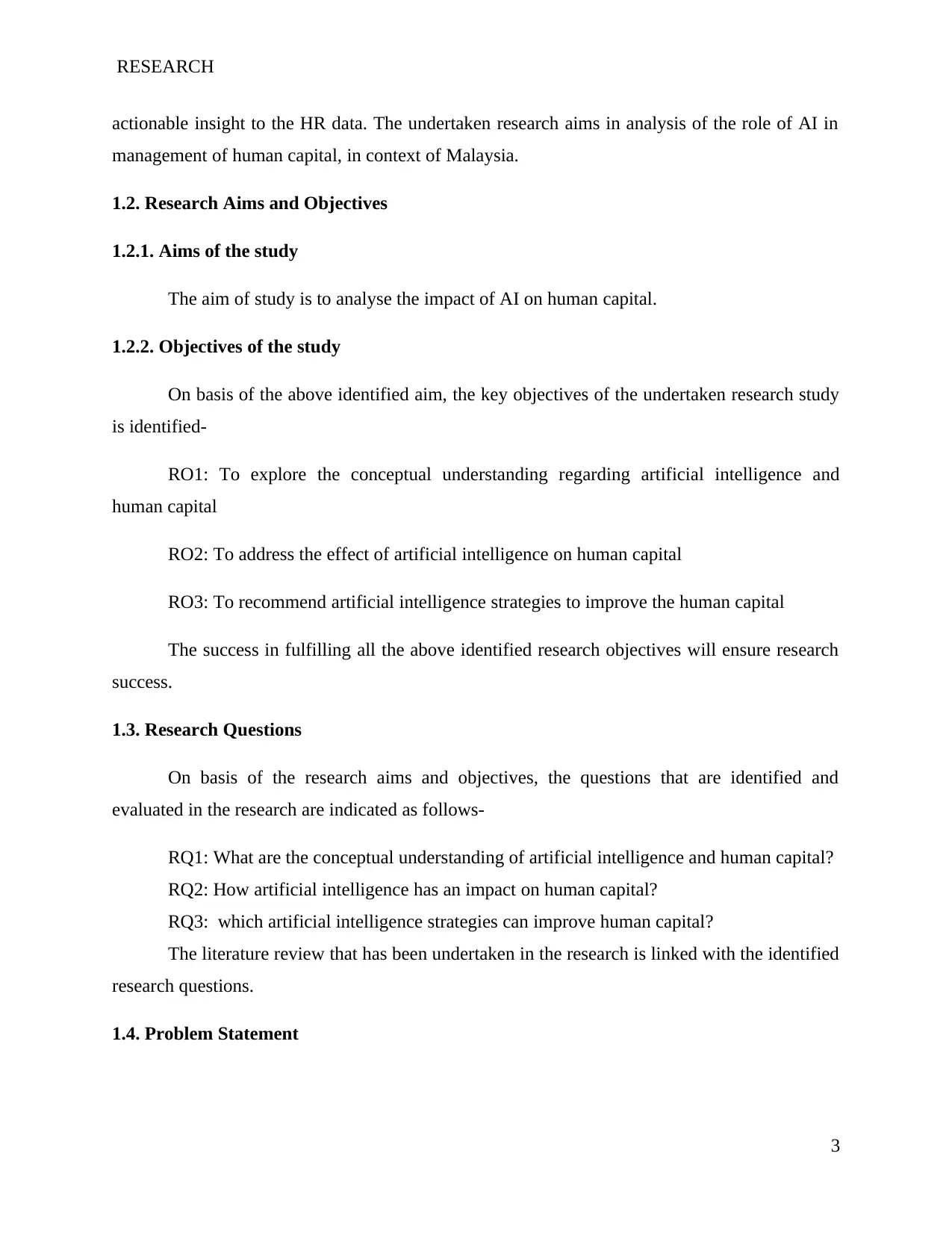
RESEARCH
actionable insight to the HR data. The undertaken research aims in analysis of the role of AI in
management of human capital, in context of Malaysia.
1.2. Research Aims and Objectives
1.2.1. Aims of the study
The aim of study is to analyse the impact of AI on human capital.
1.2.2. Objectives of the study
On basis of the above identified aim, the key objectives of the undertaken research study
is identified-
RO1: To explore the conceptual understanding regarding artificial intelligence and
human capital
RO2: To address the effect of artificial intelligence on human capital
RO3: To recommend artificial intelligence strategies to improve the human capital
The success in fulfilling all the above identified research objectives will ensure research
success.
1.3. Research Questions
On basis of the research aims and objectives, the questions that are identified and
evaluated in the research are indicated as follows-
RQ1: What are the conceptual understanding of artificial intelligence and human capital?
RQ2: How artificial intelligence has an impact on human capital?
RQ3: which artificial intelligence strategies can improve human capital?
The literature review that has been undertaken in the research is linked with the identified
research questions.
1.4. Problem Statement
3
actionable insight to the HR data. The undertaken research aims in analysis of the role of AI in
management of human capital, in context of Malaysia.
1.2. Research Aims and Objectives
1.2.1. Aims of the study
The aim of study is to analyse the impact of AI on human capital.
1.2.2. Objectives of the study
On basis of the above identified aim, the key objectives of the undertaken research study
is identified-
RO1: To explore the conceptual understanding regarding artificial intelligence and
human capital
RO2: To address the effect of artificial intelligence on human capital
RO3: To recommend artificial intelligence strategies to improve the human capital
The success in fulfilling all the above identified research objectives will ensure research
success.
1.3. Research Questions
On basis of the research aims and objectives, the questions that are identified and
evaluated in the research are indicated as follows-
RQ1: What are the conceptual understanding of artificial intelligence and human capital?
RQ2: How artificial intelligence has an impact on human capital?
RQ3: which artificial intelligence strategies can improve human capital?
The literature review that has been undertaken in the research is linked with the identified
research questions.
1.4. Problem Statement
3
Paraphrase This Document
Need a fresh take? Get an instant paraphrase of this document with our AI Paraphraser
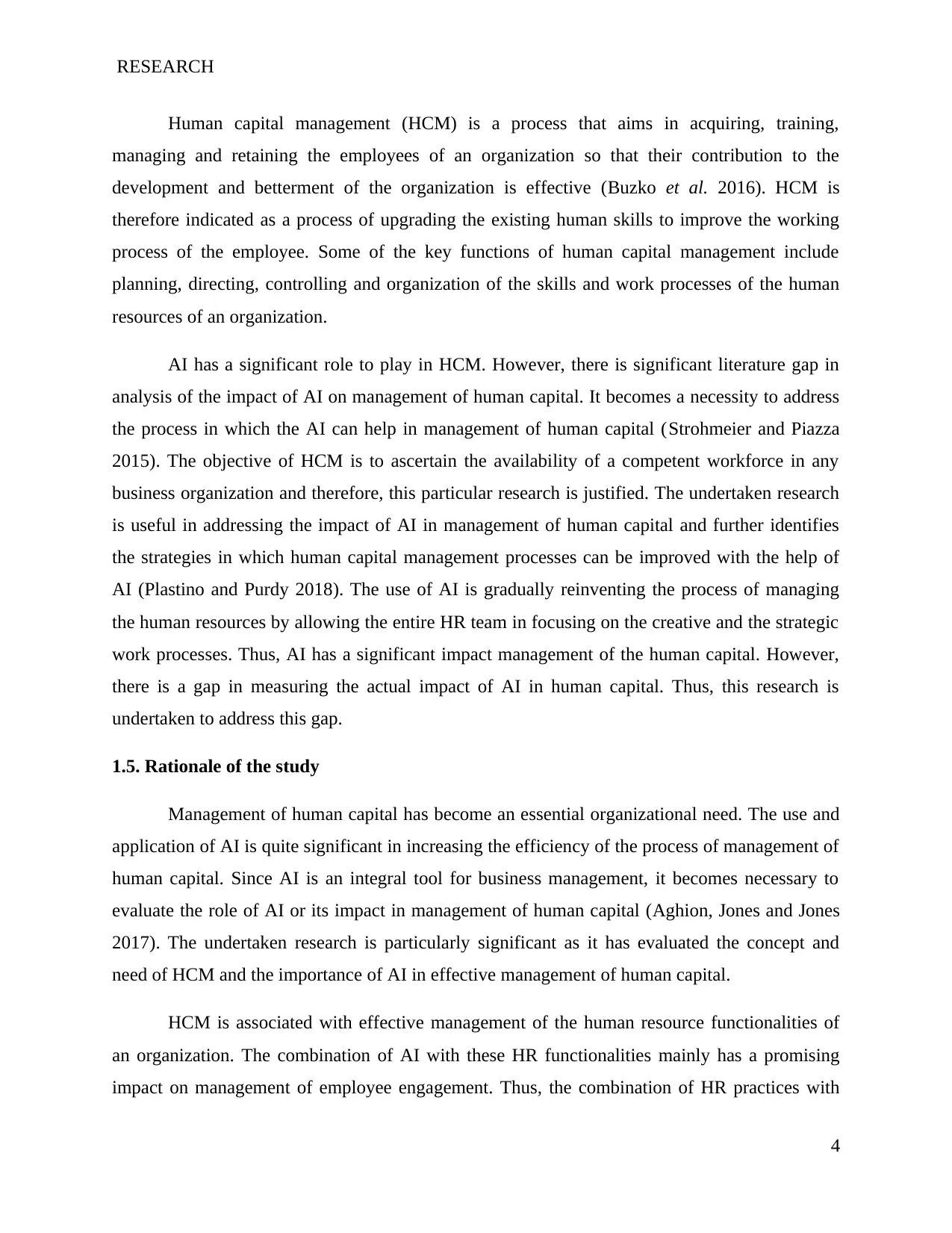
RESEARCH
Human capital management (HCM) is a process that aims in acquiring, training,
managing and retaining the employees of an organization so that their contribution to the
development and betterment of the organization is effective (Buzko et al. 2016). HCM is
therefore indicated as a process of upgrading the existing human skills to improve the working
process of the employee. Some of the key functions of human capital management include
planning, directing, controlling and organization of the skills and work processes of the human
resources of an organization.
AI has a significant role to play in HCM. However, there is significant literature gap in
analysis of the impact of AI on management of human capital. It becomes a necessity to address
the process in which the AI can help in management of human capital (Strohmeier and Piazza
2015). The objective of HCM is to ascertain the availability of a competent workforce in any
business organization and therefore, this particular research is justified. The undertaken research
is useful in addressing the impact of AI in management of human capital and further identifies
the strategies in which human capital management processes can be improved with the help of
AI (Plastino and Purdy 2018). The use of AI is gradually reinventing the process of managing
the human resources by allowing the entire HR team in focusing on the creative and the strategic
work processes. Thus, AI has a significant impact management of the human capital. However,
there is a gap in measuring the actual impact of AI in human capital. Thus, this research is
undertaken to address this gap.
1.5. Rationale of the study
Management of human capital has become an essential organizational need. The use and
application of AI is quite significant in increasing the efficiency of the process of management of
human capital. Since AI is an integral tool for business management, it becomes necessary to
evaluate the role of AI or its impact in management of human capital (Aghion, Jones and Jones
2017). The undertaken research is particularly significant as it has evaluated the concept and
need of HCM and the importance of AI in effective management of human capital.
HCM is associated with effective management of the human resource functionalities of
an organization. The combination of AI with these HR functionalities mainly has a promising
impact on management of employee engagement. Thus, the combination of HR practices with
4
Human capital management (HCM) is a process that aims in acquiring, training,
managing and retaining the employees of an organization so that their contribution to the
development and betterment of the organization is effective (Buzko et al. 2016). HCM is
therefore indicated as a process of upgrading the existing human skills to improve the working
process of the employee. Some of the key functions of human capital management include
planning, directing, controlling and organization of the skills and work processes of the human
resources of an organization.
AI has a significant role to play in HCM. However, there is significant literature gap in
analysis of the impact of AI on management of human capital. It becomes a necessity to address
the process in which the AI can help in management of human capital (Strohmeier and Piazza
2015). The objective of HCM is to ascertain the availability of a competent workforce in any
business organization and therefore, this particular research is justified. The undertaken research
is useful in addressing the impact of AI in management of human capital and further identifies
the strategies in which human capital management processes can be improved with the help of
AI (Plastino and Purdy 2018). The use of AI is gradually reinventing the process of managing
the human resources by allowing the entire HR team in focusing on the creative and the strategic
work processes. Thus, AI has a significant impact management of the human capital. However,
there is a gap in measuring the actual impact of AI in human capital. Thus, this research is
undertaken to address this gap.
1.5. Rationale of the study
Management of human capital has become an essential organizational need. The use and
application of AI is quite significant in increasing the efficiency of the process of management of
human capital. Since AI is an integral tool for business management, it becomes necessary to
evaluate the role of AI or its impact in management of human capital (Aghion, Jones and Jones
2017). The undertaken research is particularly significant as it has evaluated the concept and
need of HCM and the importance of AI in effective management of human capital.
HCM is associated with effective management of the human resource functionalities of
an organization. The combination of AI with these HR functionalities mainly has a promising
impact on management of employee engagement. Thus, the combination of HR practices with
4
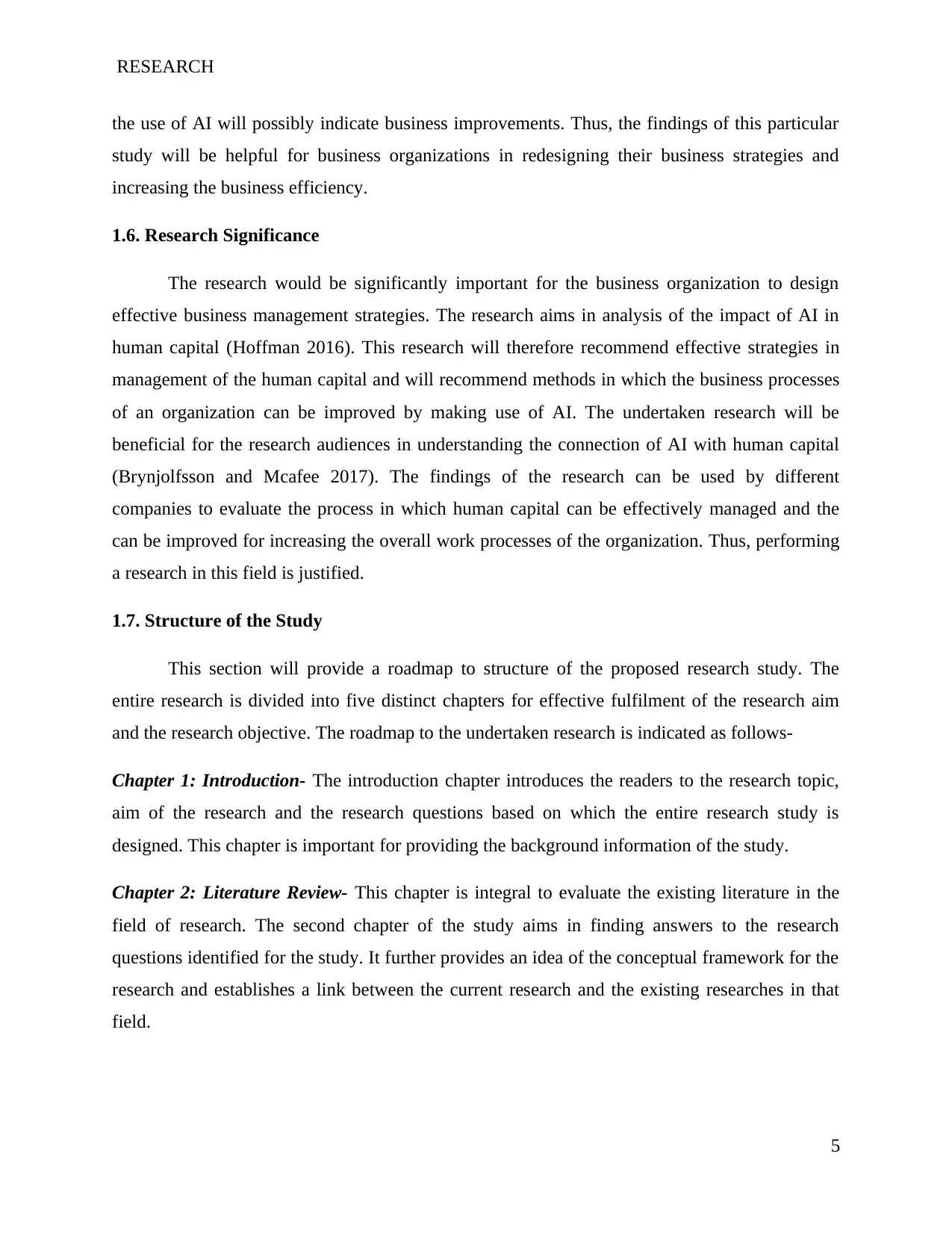
RESEARCH
the use of AI will possibly indicate business improvements. Thus, the findings of this particular
study will be helpful for business organizations in redesigning their business strategies and
increasing the business efficiency.
1.6. Research Significance
The research would be significantly important for the business organization to design
effective business management strategies. The research aims in analysis of the impact of AI in
human capital (Hoffman 2016). This research will therefore recommend effective strategies in
management of the human capital and will recommend methods in which the business processes
of an organization can be improved by making use of AI. The undertaken research will be
beneficial for the research audiences in understanding the connection of AI with human capital
(Brynjolfsson and Mcafee 2017). The findings of the research can be used by different
companies to evaluate the process in which human capital can be effectively managed and the
can be improved for increasing the overall work processes of the organization. Thus, performing
a research in this field is justified.
1.7. Structure of the Study
This section will provide a roadmap to structure of the proposed research study. The
entire research is divided into five distinct chapters for effective fulfilment of the research aim
and the research objective. The roadmap to the undertaken research is indicated as follows-
Chapter 1: Introduction- The introduction chapter introduces the readers to the research topic,
aim of the research and the research questions based on which the entire research study is
designed. This chapter is important for providing the background information of the study.
Chapter 2: Literature Review- This chapter is integral to evaluate the existing literature in the
field of research. The second chapter of the study aims in finding answers to the research
questions identified for the study. It further provides an idea of the conceptual framework for the
research and establishes a link between the current research and the existing researches in that
field.
5
the use of AI will possibly indicate business improvements. Thus, the findings of this particular
study will be helpful for business organizations in redesigning their business strategies and
increasing the business efficiency.
1.6. Research Significance
The research would be significantly important for the business organization to design
effective business management strategies. The research aims in analysis of the impact of AI in
human capital (Hoffman 2016). This research will therefore recommend effective strategies in
management of the human capital and will recommend methods in which the business processes
of an organization can be improved by making use of AI. The undertaken research will be
beneficial for the research audiences in understanding the connection of AI with human capital
(Brynjolfsson and Mcafee 2017). The findings of the research can be used by different
companies to evaluate the process in which human capital can be effectively managed and the
can be improved for increasing the overall work processes of the organization. Thus, performing
a research in this field is justified.
1.7. Structure of the Study
This section will provide a roadmap to structure of the proposed research study. The
entire research is divided into five distinct chapters for effective fulfilment of the research aim
and the research objective. The roadmap to the undertaken research is indicated as follows-
Chapter 1: Introduction- The introduction chapter introduces the readers to the research topic,
aim of the research and the research questions based on which the entire research study is
designed. This chapter is important for providing the background information of the study.
Chapter 2: Literature Review- This chapter is integral to evaluate the existing literature in the
field of research. The second chapter of the study aims in finding answers to the research
questions identified for the study. It further provides an idea of the conceptual framework for the
research and establishes a link between the current research and the existing researches in that
field.
5
⊘ This is a preview!⊘
Do you want full access?
Subscribe today to unlock all pages.

Trusted by 1+ million students worldwide
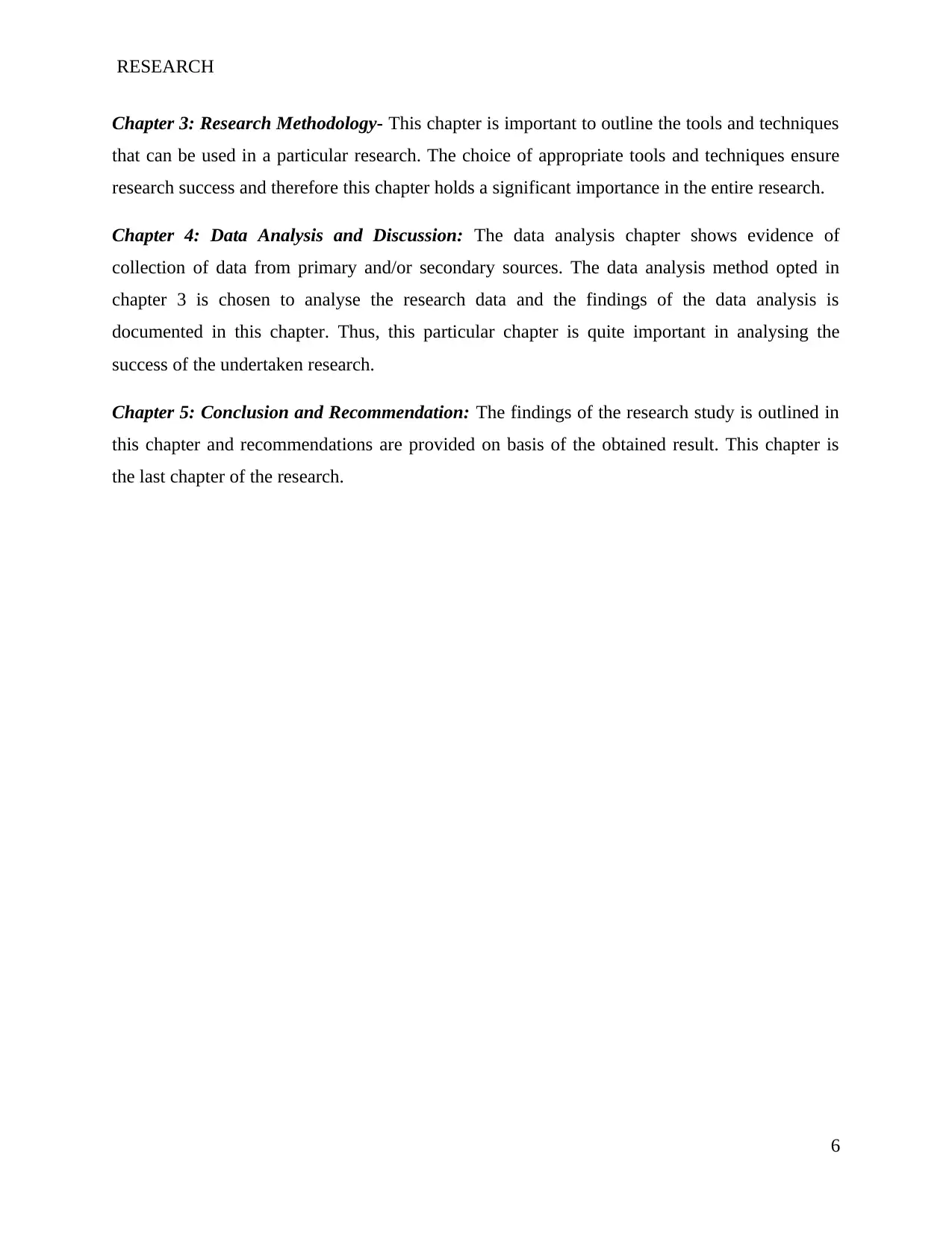
RESEARCH
Chapter 3: Research Methodology- This chapter is important to outline the tools and techniques
that can be used in a particular research. The choice of appropriate tools and techniques ensure
research success and therefore this chapter holds a significant importance in the entire research.
Chapter 4: Data Analysis and Discussion: The data analysis chapter shows evidence of
collection of data from primary and/or secondary sources. The data analysis method opted in
chapter 3 is chosen to analyse the research data and the findings of the data analysis is
documented in this chapter. Thus, this particular chapter is quite important in analysing the
success of the undertaken research.
Chapter 5: Conclusion and Recommendation: The findings of the research study is outlined in
this chapter and recommendations are provided on basis of the obtained result. This chapter is
the last chapter of the research.
6
Chapter 3: Research Methodology- This chapter is important to outline the tools and techniques
that can be used in a particular research. The choice of appropriate tools and techniques ensure
research success and therefore this chapter holds a significant importance in the entire research.
Chapter 4: Data Analysis and Discussion: The data analysis chapter shows evidence of
collection of data from primary and/or secondary sources. The data analysis method opted in
chapter 3 is chosen to analyse the research data and the findings of the data analysis is
documented in this chapter. Thus, this particular chapter is quite important in analysing the
success of the undertaken research.
Chapter 5: Conclusion and Recommendation: The findings of the research study is outlined in
this chapter and recommendations are provided on basis of the obtained result. This chapter is
the last chapter of the research.
6
Paraphrase This Document
Need a fresh take? Get an instant paraphrase of this document with our AI Paraphraser
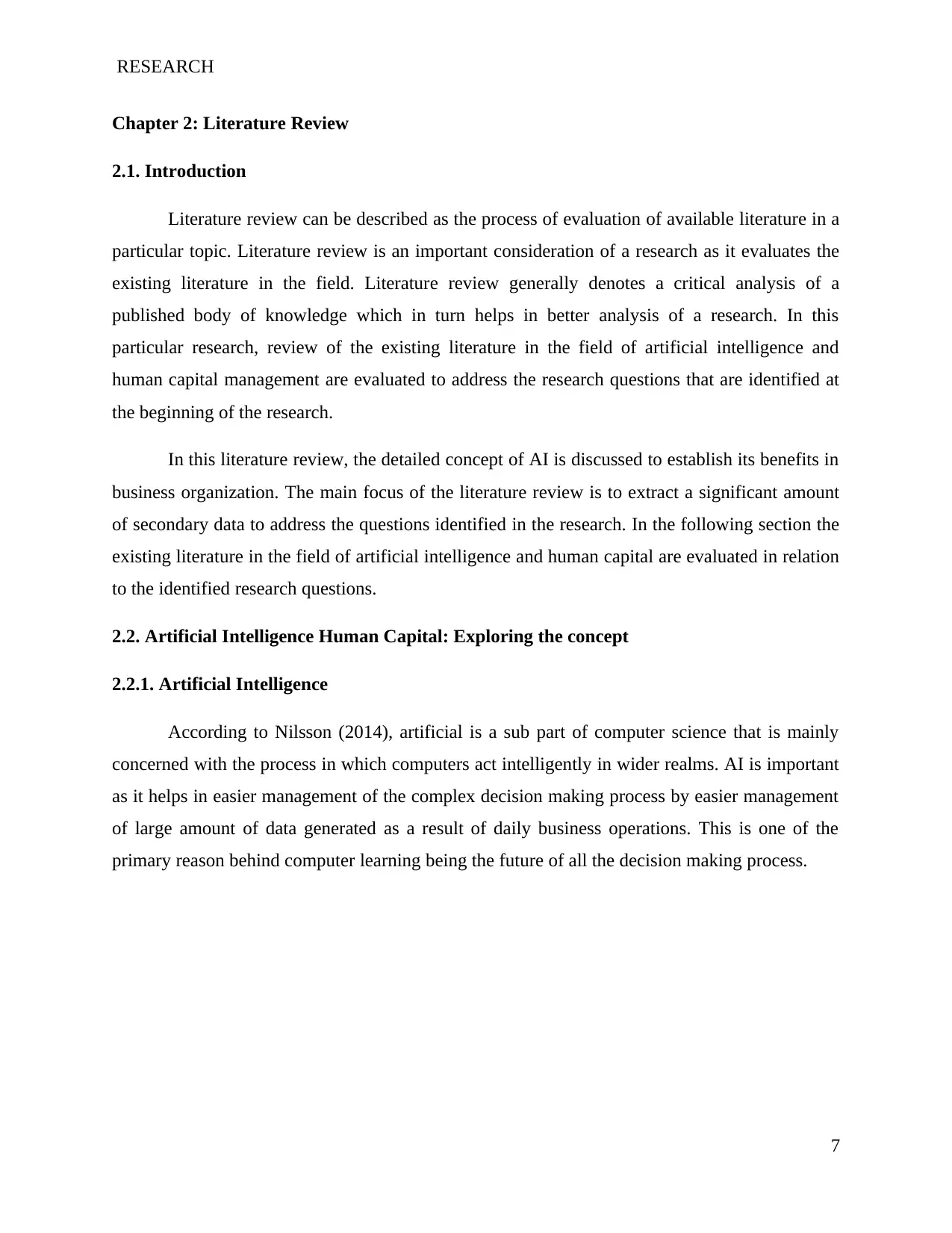
RESEARCH
Chapter 2: Literature Review
2.1. Introduction
Literature review can be described as the process of evaluation of available literature in a
particular topic. Literature review is an important consideration of a research as it evaluates the
existing literature in the field. Literature review generally denotes a critical analysis of a
published body of knowledge which in turn helps in better analysis of a research. In this
particular research, review of the existing literature in the field of artificial intelligence and
human capital management are evaluated to address the research questions that are identified at
the beginning of the research.
In this literature review, the detailed concept of AI is discussed to establish its benefits in
business organization. The main focus of the literature review is to extract a significant amount
of secondary data to address the questions identified in the research. In the following section the
existing literature in the field of artificial intelligence and human capital are evaluated in relation
to the identified research questions.
2.2. Artificial Intelligence Human Capital: Exploring the concept
2.2.1. Artificial Intelligence
According to Nilsson (2014), artificial is a sub part of computer science that is mainly
concerned with the process in which computers act intelligently in wider realms. AI is important
as it helps in easier management of the complex decision making process by easier management
of large amount of data generated as a result of daily business operations. This is one of the
primary reason behind computer learning being the future of all the decision making process.
7
Chapter 2: Literature Review
2.1. Introduction
Literature review can be described as the process of evaluation of available literature in a
particular topic. Literature review is an important consideration of a research as it evaluates the
existing literature in the field. Literature review generally denotes a critical analysis of a
published body of knowledge which in turn helps in better analysis of a research. In this
particular research, review of the existing literature in the field of artificial intelligence and
human capital management are evaluated to address the research questions that are identified at
the beginning of the research.
In this literature review, the detailed concept of AI is discussed to establish its benefits in
business organization. The main focus of the literature review is to extract a significant amount
of secondary data to address the questions identified in the research. In the following section the
existing literature in the field of artificial intelligence and human capital are evaluated in relation
to the identified research questions.
2.2. Artificial Intelligence Human Capital: Exploring the concept
2.2.1. Artificial Intelligence
According to Nilsson (2014), artificial is a sub part of computer science that is mainly
concerned with the process in which computers act intelligently in wider realms. AI is important
as it helps in easier management of the complex decision making process by easier management
of large amount of data generated as a result of daily business operations. This is one of the
primary reason behind computer learning being the future of all the decision making process.
7
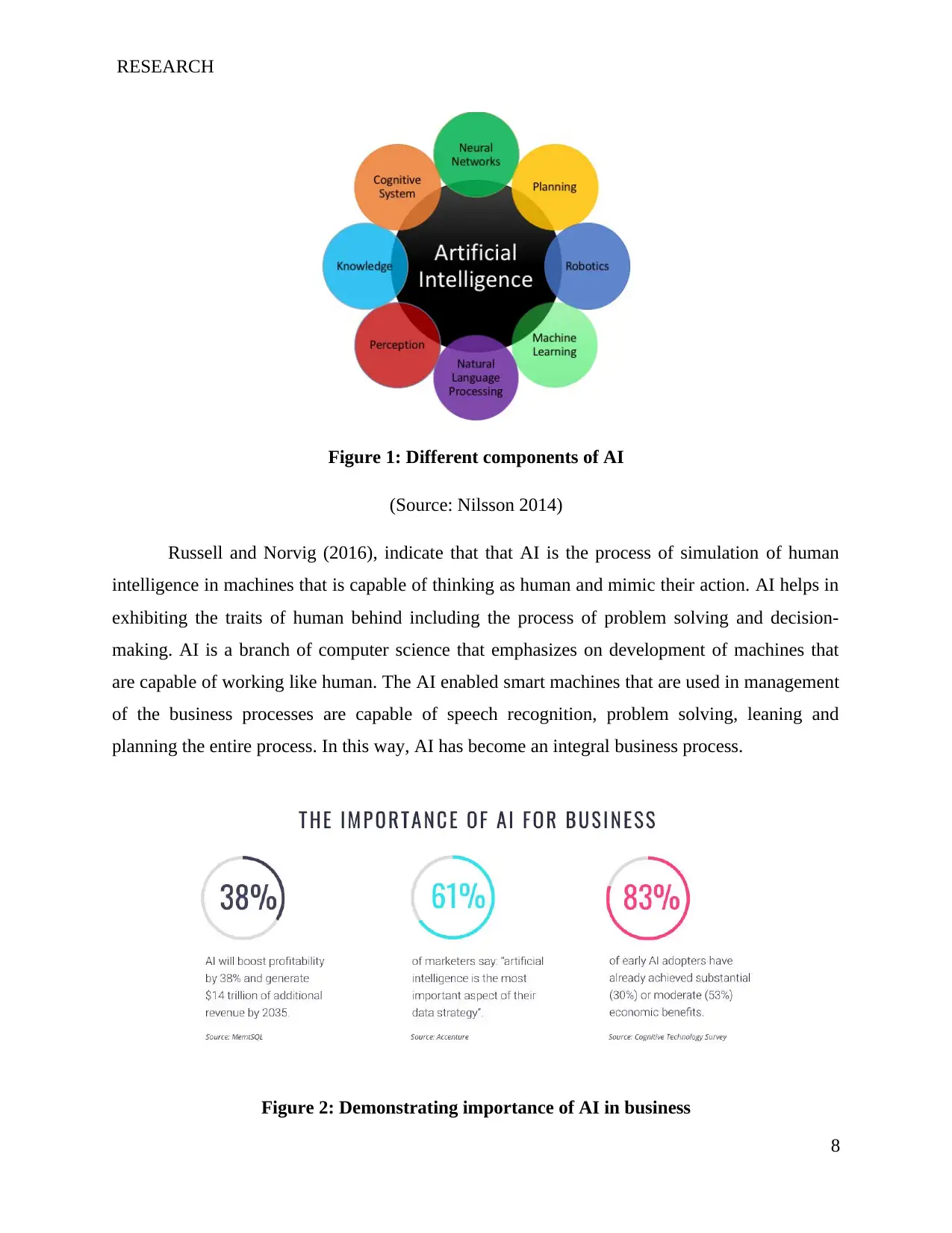
RESEARCH
Figure 1: Different components of AI
(Source: Nilsson 2014)
Russell and Norvig (2016), indicate that that AI is the process of simulation of human
intelligence in machines that is capable of thinking as human and mimic their action. AI helps in
exhibiting the traits of human behind including the process of problem solving and decision-
making. AI is a branch of computer science that emphasizes on development of machines that
are capable of working like human. The AI enabled smart machines that are used in management
of the business processes are capable of speech recognition, problem solving, leaning and
planning the entire process. In this way, AI has become an integral business process.
Figure 2: Demonstrating importance of AI in business
8
Figure 1: Different components of AI
(Source: Nilsson 2014)
Russell and Norvig (2016), indicate that that AI is the process of simulation of human
intelligence in machines that is capable of thinking as human and mimic their action. AI helps in
exhibiting the traits of human behind including the process of problem solving and decision-
making. AI is a branch of computer science that emphasizes on development of machines that
are capable of working like human. The AI enabled smart machines that are used in management
of the business processes are capable of speech recognition, problem solving, leaning and
planning the entire process. In this way, AI has become an integral business process.
Figure 2: Demonstrating importance of AI in business
8
⊘ This is a preview!⊘
Do you want full access?
Subscribe today to unlock all pages.

Trusted by 1+ million students worldwide
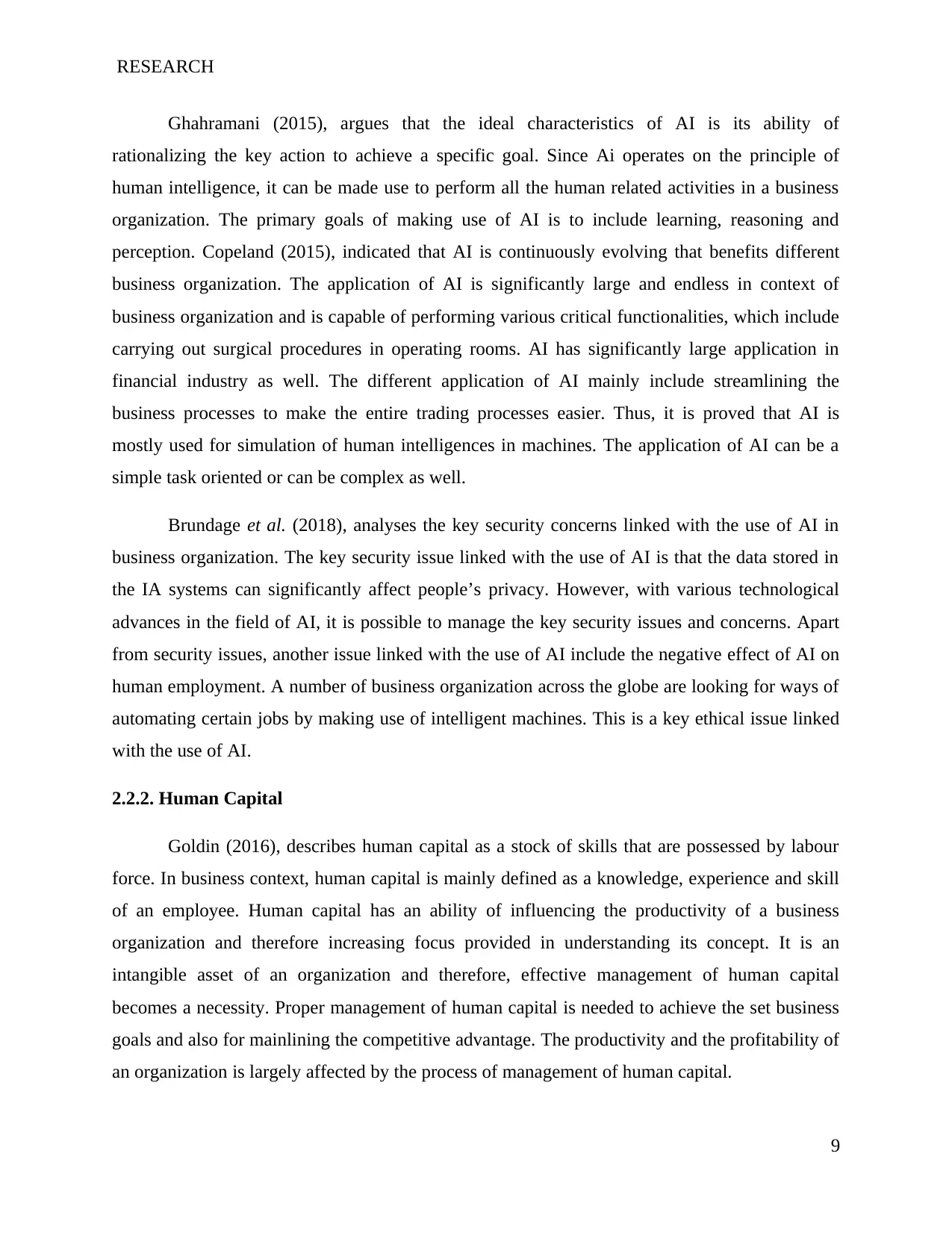
RESEARCH
Ghahramani (2015), argues that the ideal characteristics of AI is its ability of
rationalizing the key action to achieve a specific goal. Since Ai operates on the principle of
human intelligence, it can be made use to perform all the human related activities in a business
organization. The primary goals of making use of AI is to include learning, reasoning and
perception. Copeland (2015), indicated that AI is continuously evolving that benefits different
business organization. The application of AI is significantly large and endless in context of
business organization and is capable of performing various critical functionalities, which include
carrying out surgical procedures in operating rooms. AI has significantly large application in
financial industry as well. The different application of AI mainly include streamlining the
business processes to make the entire trading processes easier. Thus, it is proved that AI is
mostly used for simulation of human intelligences in machines. The application of AI can be a
simple task oriented or can be complex as well.
Brundage et al. (2018), analyses the key security concerns linked with the use of AI in
business organization. The key security issue linked with the use of AI is that the data stored in
the IA systems can significantly affect people’s privacy. However, with various technological
advances in the field of AI, it is possible to manage the key security issues and concerns. Apart
from security issues, another issue linked with the use of AI include the negative effect of AI on
human employment. A number of business organization across the globe are looking for ways of
automating certain jobs by making use of intelligent machines. This is a key ethical issue linked
with the use of AI.
2.2.2. Human Capital
Goldin (2016), describes human capital as a stock of skills that are possessed by labour
force. In business context, human capital is mainly defined as a knowledge, experience and skill
of an employee. Human capital has an ability of influencing the productivity of a business
organization and therefore increasing focus provided in understanding its concept. It is an
intangible asset of an organization and therefore, effective management of human capital
becomes a necessity. Proper management of human capital is needed to achieve the set business
goals and also for mainlining the competitive advantage. The productivity and the profitability of
an organization is largely affected by the process of management of human capital.
9
Ghahramani (2015), argues that the ideal characteristics of AI is its ability of
rationalizing the key action to achieve a specific goal. Since Ai operates on the principle of
human intelligence, it can be made use to perform all the human related activities in a business
organization. The primary goals of making use of AI is to include learning, reasoning and
perception. Copeland (2015), indicated that AI is continuously evolving that benefits different
business organization. The application of AI is significantly large and endless in context of
business organization and is capable of performing various critical functionalities, which include
carrying out surgical procedures in operating rooms. AI has significantly large application in
financial industry as well. The different application of AI mainly include streamlining the
business processes to make the entire trading processes easier. Thus, it is proved that AI is
mostly used for simulation of human intelligences in machines. The application of AI can be a
simple task oriented or can be complex as well.
Brundage et al. (2018), analyses the key security concerns linked with the use of AI in
business organization. The key security issue linked with the use of AI is that the data stored in
the IA systems can significantly affect people’s privacy. However, with various technological
advances in the field of AI, it is possible to manage the key security issues and concerns. Apart
from security issues, another issue linked with the use of AI include the negative effect of AI on
human employment. A number of business organization across the globe are looking for ways of
automating certain jobs by making use of intelligent machines. This is a key ethical issue linked
with the use of AI.
2.2.2. Human Capital
Goldin (2016), describes human capital as a stock of skills that are possessed by labour
force. In business context, human capital is mainly defined as a knowledge, experience and skill
of an employee. Human capital has an ability of influencing the productivity of a business
organization and therefore increasing focus provided in understanding its concept. It is an
intangible asset of an organization and therefore, effective management of human capital
becomes a necessity. Proper management of human capital is needed to achieve the set business
goals and also for mainlining the competitive advantage. The productivity and the profitability of
an organization is largely affected by the process of management of human capital.
9
Paraphrase This Document
Need a fresh take? Get an instant paraphrase of this document with our AI Paraphraser
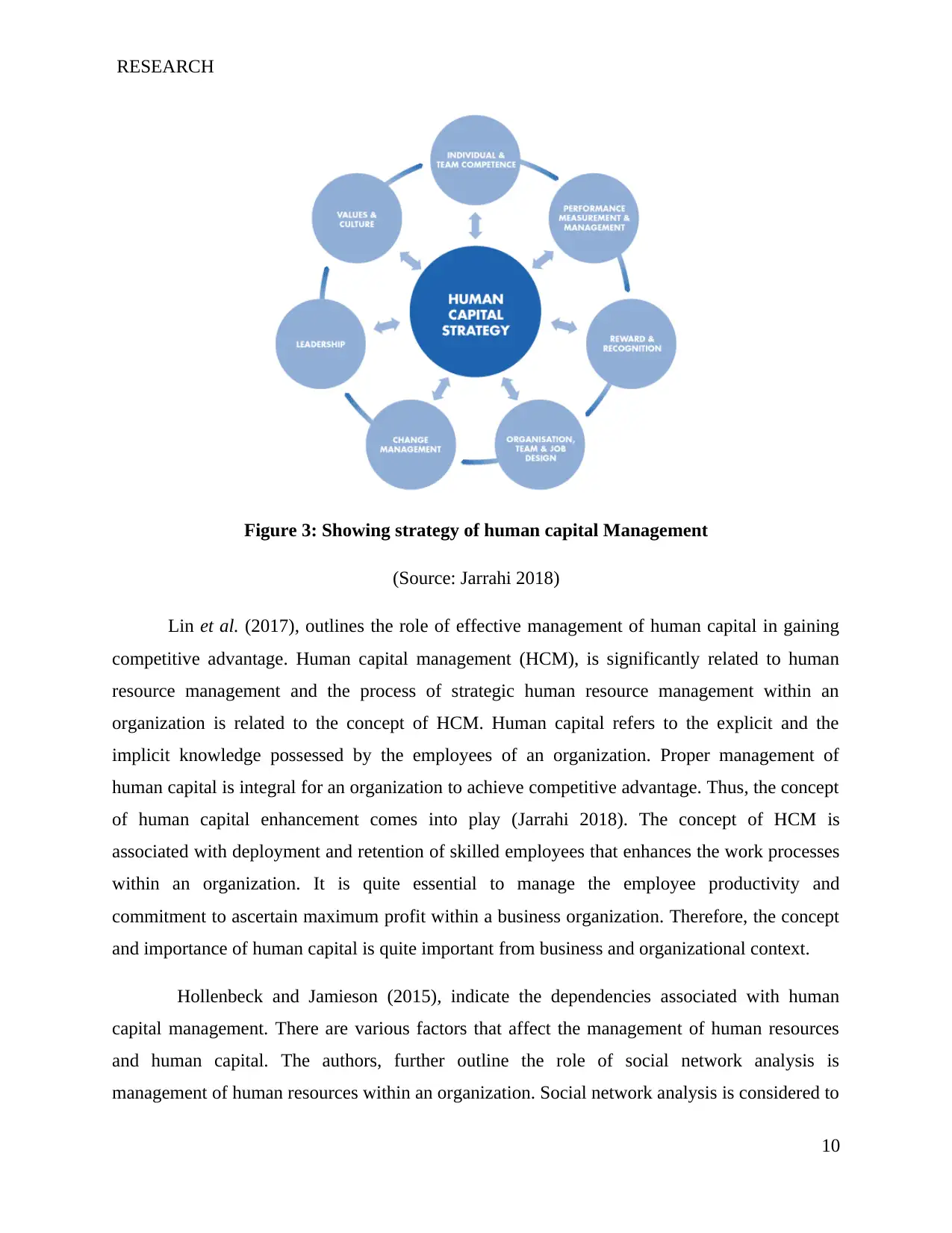
RESEARCH
Figure 3: Showing strategy of human capital Management
(Source: Jarrahi 2018)
Lin et al. (2017), outlines the role of effective management of human capital in gaining
competitive advantage. Human capital management (HCM), is significantly related to human
resource management and the process of strategic human resource management within an
organization is related to the concept of HCM. Human capital refers to the explicit and the
implicit knowledge possessed by the employees of an organization. Proper management of
human capital is integral for an organization to achieve competitive advantage. Thus, the concept
of human capital enhancement comes into play (Jarrahi 2018). The concept of HCM is
associated with deployment and retention of skilled employees that enhances the work processes
within an organization. It is quite essential to manage the employee productivity and
commitment to ascertain maximum profit within a business organization. Therefore, the concept
and importance of human capital is quite important from business and organizational context.
Hollenbeck and Jamieson (2015), indicate the dependencies associated with human
capital management. There are various factors that affect the management of human resources
and human capital. The authors, further outline the role of social network analysis is
management of human resources within an organization. Social network analysis is considered to
10
Figure 3: Showing strategy of human capital Management
(Source: Jarrahi 2018)
Lin et al. (2017), outlines the role of effective management of human capital in gaining
competitive advantage. Human capital management (HCM), is significantly related to human
resource management and the process of strategic human resource management within an
organization is related to the concept of HCM. Human capital refers to the explicit and the
implicit knowledge possessed by the employees of an organization. Proper management of
human capital is integral for an organization to achieve competitive advantage. Thus, the concept
of human capital enhancement comes into play (Jarrahi 2018). The concept of HCM is
associated with deployment and retention of skilled employees that enhances the work processes
within an organization. It is quite essential to manage the employee productivity and
commitment to ascertain maximum profit within a business organization. Therefore, the concept
and importance of human capital is quite important from business and organizational context.
Hollenbeck and Jamieson (2015), indicate the dependencies associated with human
capital management. There are various factors that affect the management of human resources
and human capital. The authors, further outline the role of social network analysis is
management of human resources within an organization. Social network analysis is considered to
10
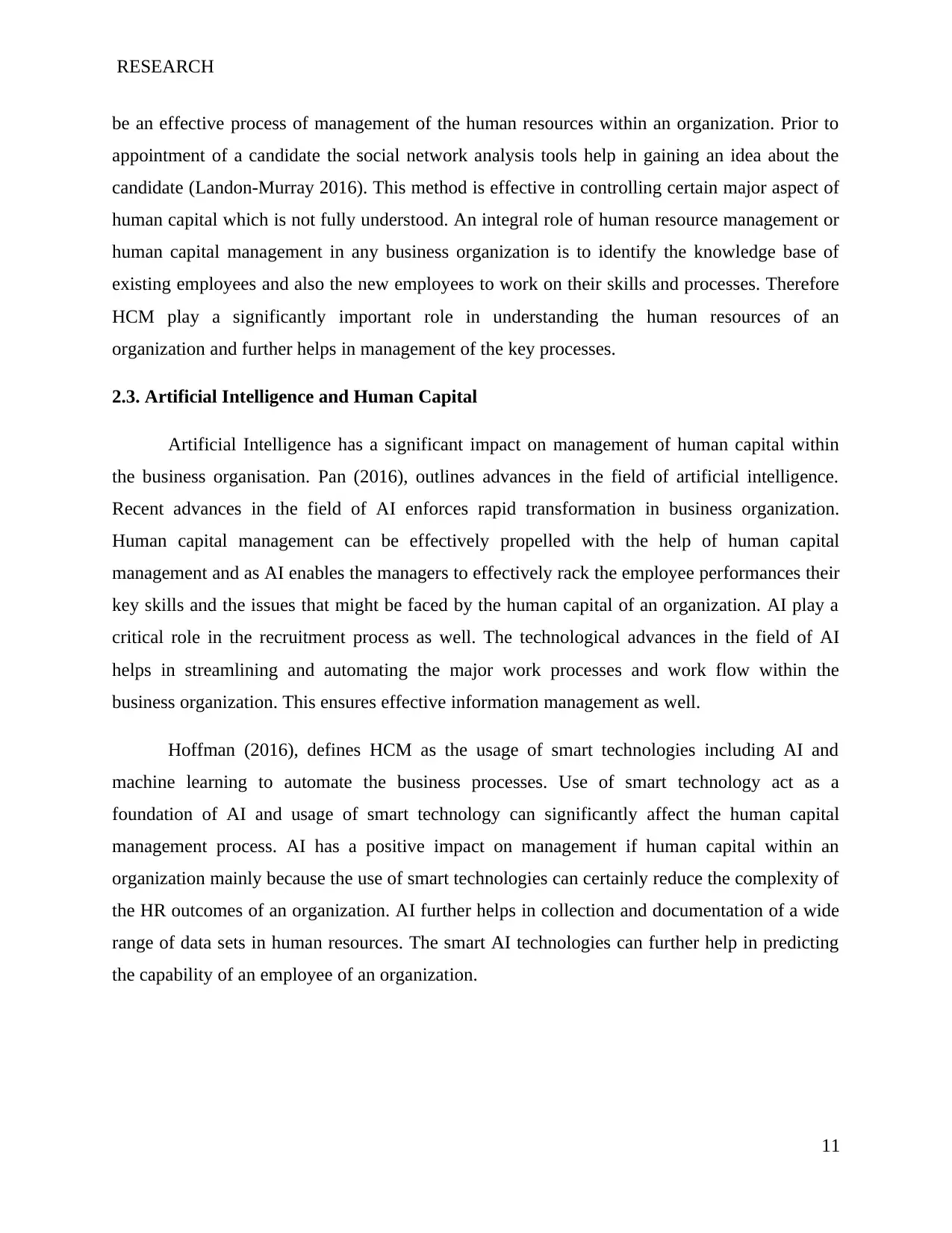
RESEARCH
be an effective process of management of the human resources within an organization. Prior to
appointment of a candidate the social network analysis tools help in gaining an idea about the
candidate (Landon-Murray 2016). This method is effective in controlling certain major aspect of
human capital which is not fully understood. An integral role of human resource management or
human capital management in any business organization is to identify the knowledge base of
existing employees and also the new employees to work on their skills and processes. Therefore
HCM play a significantly important role in understanding the human resources of an
organization and further helps in management of the key processes.
2.3. Artificial Intelligence and Human Capital
Artificial Intelligence has a significant impact on management of human capital within
the business organisation. Pan (2016), outlines advances in the field of artificial intelligence.
Recent advances in the field of AI enforces rapid transformation in business organization.
Human capital management can be effectively propelled with the help of human capital
management and as AI enables the managers to effectively rack the employee performances their
key skills and the issues that might be faced by the human capital of an organization. AI play a
critical role in the recruitment process as well. The technological advances in the field of AI
helps in streamlining and automating the major work processes and work flow within the
business organization. This ensures effective information management as well.
Hoffman (2016), defines HCM as the usage of smart technologies including AI and
machine learning to automate the business processes. Use of smart technology act as a
foundation of AI and usage of smart technology can significantly affect the human capital
management process. AI has a positive impact on management if human capital within an
organization mainly because the use of smart technologies can certainly reduce the complexity of
the HR outcomes of an organization. AI further helps in collection and documentation of a wide
range of data sets in human resources. The smart AI technologies can further help in predicting
the capability of an employee of an organization.
11
be an effective process of management of the human resources within an organization. Prior to
appointment of a candidate the social network analysis tools help in gaining an idea about the
candidate (Landon-Murray 2016). This method is effective in controlling certain major aspect of
human capital which is not fully understood. An integral role of human resource management or
human capital management in any business organization is to identify the knowledge base of
existing employees and also the new employees to work on their skills and processes. Therefore
HCM play a significantly important role in understanding the human resources of an
organization and further helps in management of the key processes.
2.3. Artificial Intelligence and Human Capital
Artificial Intelligence has a significant impact on management of human capital within
the business organisation. Pan (2016), outlines advances in the field of artificial intelligence.
Recent advances in the field of AI enforces rapid transformation in business organization.
Human capital management can be effectively propelled with the help of human capital
management and as AI enables the managers to effectively rack the employee performances their
key skills and the issues that might be faced by the human capital of an organization. AI play a
critical role in the recruitment process as well. The technological advances in the field of AI
helps in streamlining and automating the major work processes and work flow within the
business organization. This ensures effective information management as well.
Hoffman (2016), defines HCM as the usage of smart technologies including AI and
machine learning to automate the business processes. Use of smart technology act as a
foundation of AI and usage of smart technology can significantly affect the human capital
management process. AI has a positive impact on management if human capital within an
organization mainly because the use of smart technologies can certainly reduce the complexity of
the HR outcomes of an organization. AI further helps in collection and documentation of a wide
range of data sets in human resources. The smart AI technologies can further help in predicting
the capability of an employee of an organization.
11
⊘ This is a preview!⊘
Do you want full access?
Subscribe today to unlock all pages.

Trusted by 1+ million students worldwide
1 out of 35
Related Documents
Your All-in-One AI-Powered Toolkit for Academic Success.
+13062052269
info@desklib.com
Available 24*7 on WhatsApp / Email
![[object Object]](/_next/static/media/star-bottom.7253800d.svg)
Unlock your academic potential
Copyright © 2020–2026 A2Z Services. All Rights Reserved. Developed and managed by ZUCOL.




